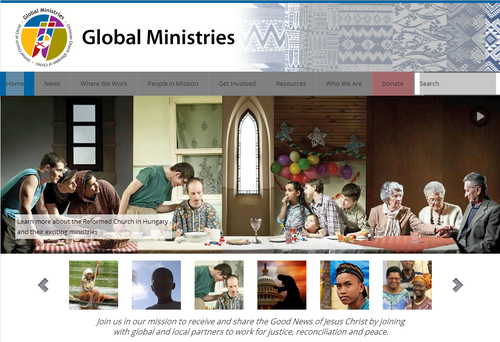Partnership is an invaluable asset for today’s global church, but it is also a broad term that encompasses many different forms of agreement and cooperation. Never is this more evident than the partnership between the Reformed Church in Hungary and Global Ministries in the USA.
Church partnership agreements come in many shapes and sizes. The RCH’s agreement with Global Ministries (GM) is unique, mainly because GM is not a single church, but is in fact the combined overseas ministry of the Christian Church (Disciples of Christ) and the United Church of Christ (UCC). It maintains ties with partner churches and organizations in 70 countries.

This month, GM has put a spotlight on the Reformed Church. The RCH will be featured on the Global Ministries website throughout the month of February with a particular focus put on the mission of the church and how it lives out this mission in the world. In addition, one project is also being highlighted so those who explore the GM website can help support the RCH’s ministry.
The project chosen is a special Roma project to create a scholarship for pastors who wish to become supervisors in the Roma ministry work being done around the country.
Since 2009, Roma ministry has been the main mission focus of the RCH. Within the Roma ministry field, support is needed for pastors serving with Roma and trying to integrate the Roma and Hungarian communities together. To accomplish this, the Reformed Church of Hungary’s Mission Department would like to create a scholarship program to finance the training of a Roma supervisor for each of the church’s four districts. Károli Gáspár Reformed University in Budapest offers a supervision program within its theological faculty that is a 2-year course. The program would cost 200,000 Forints a semester per student (~ $900/semester). The hope is that these Roma supervisors will be able to act as a resource for pastors in their respective district as well as a medium for the exchange of best practices and experiences from around the country.
In the fall of 2013, Peter Makari, the GM Area Executive for Europe and the Middle East (one of GM’s five main area offices), visited the RCH as the first stop on a longer trip visiting partners and four GM global mission interns. One purpose for the visit, he said, was to sustain the relations of the RCH and UCC.
GM has several different types of partners. The RCH is considered a historic partner because there is a long history between the two institutions and organic ties still exist in the form of many Hungarian members within the UCC. The trip also serves as an opportunity to learn new ways of engaging with the RCH and a time to discuss face-to-face what is happening in the church and country as well.
According to Makari, GM sees itself as part of the world church – one body – one that is not complete without other churches and not limited by national lines. Furthermore, it is partner relations that make this body manifest.
He went on to say that GM’s partnerships in Europe look differently than its others around the world, but that doesn’t mean their importance differs. Relations in Europe, including the RCH, are just as important and can serve as an entryway for church members from Disciples and UCC congregations to learn about global mission and the global church.
The organizations’ agreement is also reflected on the GM board, where Balázs Ódor, ecumenical officer for the RCH, is completing his first term. The board consists of GM leaders as well as international partners, so that partners are present and can share in decision-making processes.
When asked about his hopes for the partnership moving forward, Makari answered saying, “My hope is that the long-standing relationship between the UCC and Disciples on one hand, and the Reformed Church in Hungary on the other, can experience new ways to find expression, in the lived ministry and witness of the two churches. During my visit, I had the chance to meet and talk with many people in a variety of ministries, and there are surely ways that we can do more together. The visit was important in that such a face-to-face encounter was possible and realized. I expect that we will be able to collaborate in new ways but that are now to be explored.”
Amy Lester